LLVM IR数据结构分析
研究了好几天终于搞清楚llvm的结构了,其实没必要但……一些pwn手对数据结构和内存分布的执着
过程及其坎坷,光编译一个带符号的.so文件就编译了好几次(╯‵□′)╯︵┻━┻(因为想看内存分布)

先放一张复杂的图(
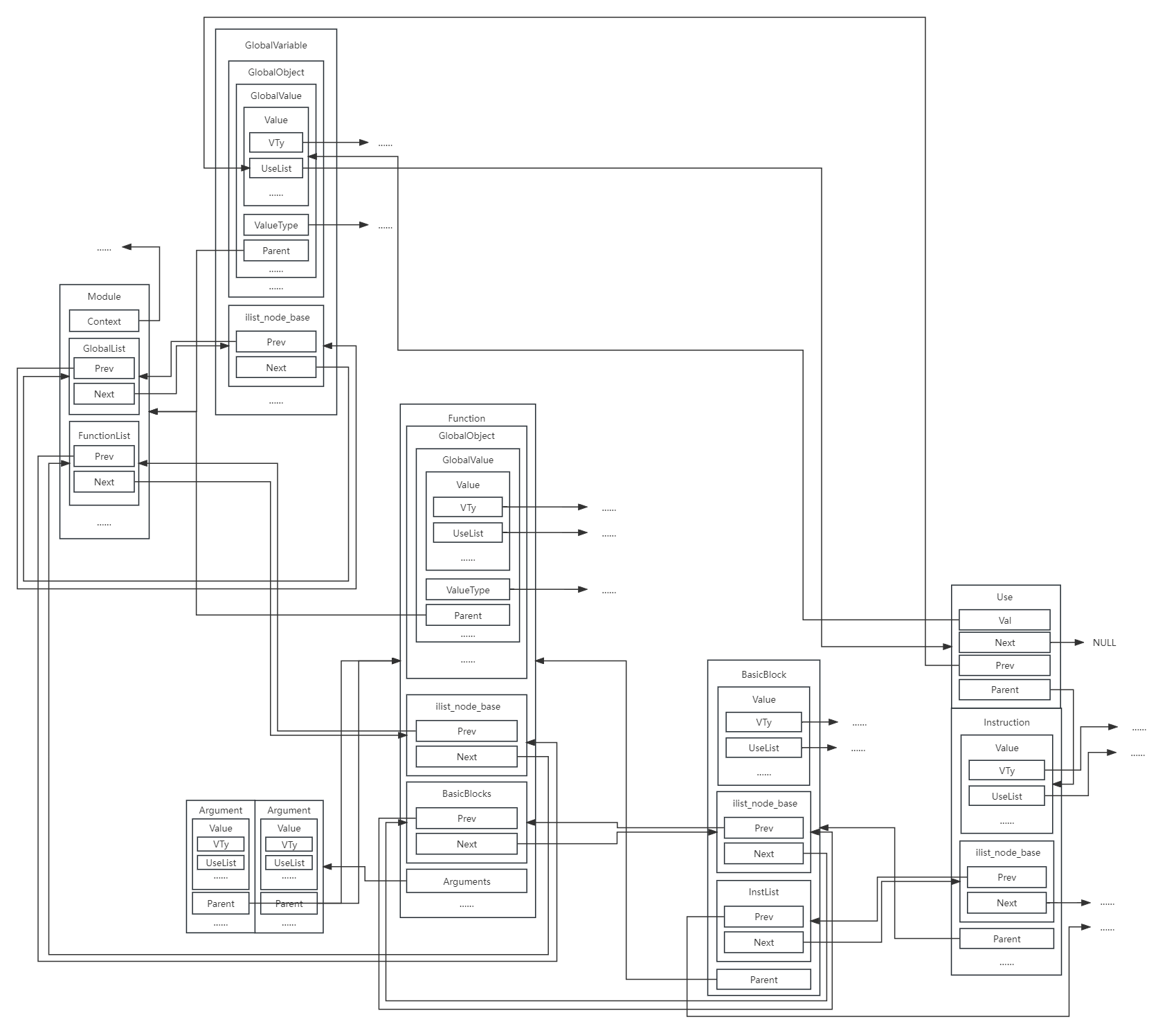
LLVMContext
一个黑盒,管理llvm中基础的、核心的“全局”数据,如类型、标准化的常量表
LLVMContext包含了llvm在一个线程中正常运行(比如一个编译任务)所需要的数据,在老版本中这些都是全局数据,现在他们被打包成了一个类LLVMContext,这样llvm就可以支持多线程的编译任务了
之后会作为传入参数多次用到,不需要具体知道是什么(
Module类中有context成员
1
2
3class Module {
private:
LLVMContext &Context;创建一个LLVMContext
1
LLVMContext & context = llvm::getGlobalContext();LLVMContext删除了拷贝构造函数
1
LLVMContext(LLVMContext &) = delete;这样就不行
1
2LLVMContext context1;
LLVMContext context2(context1);LLVMContext删除了拷贝赋值运算符
1
LLVMContext &operator=(const LLVMContext &) = delete;这样会不行
1
2
3LLVMContext context1;
LLVMContext context2;
context2 = context1要注意使用引用
Module
一些碎碎念:c++太恶心了,嵌套n层类就是一个双链表
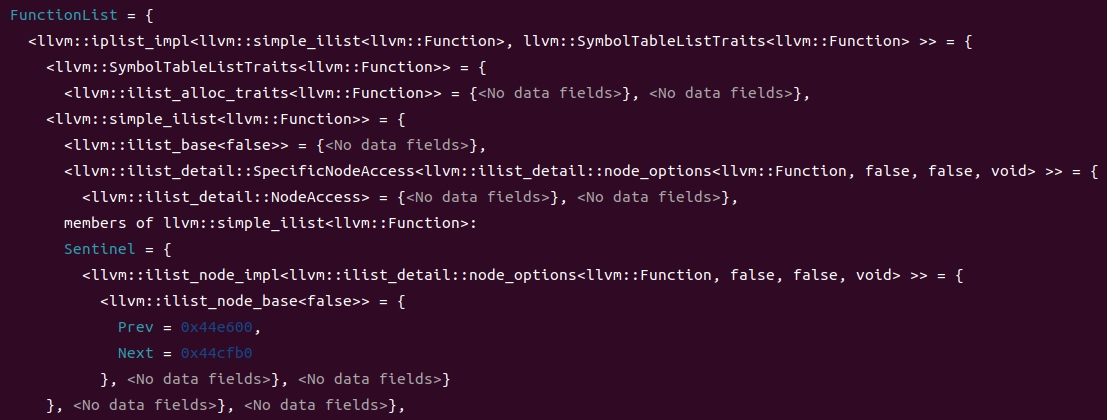
Module主要的成员主要是函数和全局变量的两个链表
1 | |
内存分布大概长这样👇
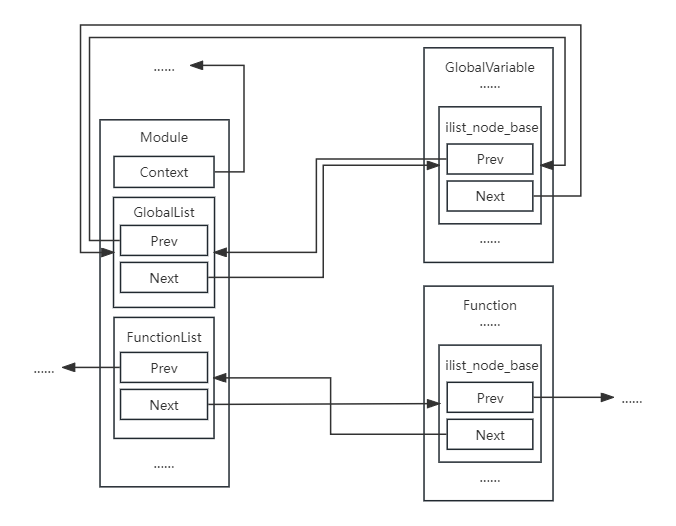
创建一个Module
创建一个Module,需要一个名字和一个LLVMContext
1 | |
一个🌰
1 | |
迭代器
Function
1
2
3
4
5
6
7
8
9
10
11
12
13
14
15
16
17
18
19
20
21/// @}
/// @name Function Iteration
/// @{
iterator begin() { return FunctionList.begin(); }
const_iterator begin() const { return FunctionList.begin(); }
iterator end () { return FunctionList.end(); }
const_iterator end () const { return FunctionList.end(); }
reverse_iterator rbegin() { return FunctionList.rbegin(); }
const_reverse_iterator rbegin() const{ return FunctionList.rbegin(); }
reverse_iterator rend() { return FunctionList.rend(); }
const_reverse_iterator rend() const { return FunctionList.rend(); }
size_t size() const { return FunctionList.size(); }
bool empty() const { return FunctionList.empty(); }
iterator_range<iterator> functions() {
return make_range(begin(), end());
}
iterator_range<const_iterator> functions() const {
return make_range(begin(), end());
}🌰
1
2
3Module *module;
for(auto &func : *module);
for(auto &func : module->functions());Global Variable
1
2
3
4
5
6
7
8
9
10
11
12
13
14
15
16
17/// @}
/// @name Global Variable Iteration
/// @{
global_iterator global_begin() { return GlobalList.begin(); }
const_global_iterator global_begin() const { return GlobalList.begin(); }
global_iterator global_end () { return GlobalList.end(); }
const_global_iterator global_end () const { return GlobalList.end(); }
size_t global_size () const { return GlobalList.size(); }
bool global_empty() const { return GlobalList.empty(); }
iterator_range<global_iterator> globals() {
return make_range(global_begin(), global_end());
}
iterator_range<const_global_iterator> globals() const {
return make_range(global_begin(), global_end());
}🌰
1
2Module *module;
for(auto &var : module->globals());
获取列表
Function
1
2
3
4/// Get the Module's list of functions (constant).
const FunctionListType &getFunctionList() const { return FunctionList; }
/// Get the Module's list of functions.
FunctionListType &getFunctionList() { return FunctionList; }Global Variable
1
2
3
4/// Get the Module's list of global variables (constant).
const GlobalListType &getGlobalList() const { return GlobalList; }
/// Get the Module's list of global variables.
GlobalListType &getGlobalList() { return GlobalList; }
函数操作
查找函数
1 | |
🌰
1 | |
查找Or插入函数
Module中提供了一系列插入or查找Function的函数
1 | |
需要
StringRef Name:函数名
Type *RetTy:返回值类型
Type类型提供了构造各种类型的静态函数,只需要提供Module的Context
1
2
3
4
5
6
7
8
9
10
11
12
13
14
15
16
17
18
19
20static Type *getVoidTy(LLVMContext &C);
static Type *getLabelTy(LLVMContext &C);
static Type *getHalfTy(LLVMContext &C);
static Type *getBFloatTy(LLVMContext &C);
static Type *getFloatTy(LLVMContext &C);
static Type *getDoubleTy(LLVMContext &C);
static Type *getMetadataTy(LLVMContext &C);
static Type *getX86_FP80Ty(LLVMContext &C);
static Type *getFP128Ty(LLVMContext &C);
static Type *getPPC_FP128Ty(LLVMContext &C);
static Type *getX86_MMXTy(LLVMContext &C);
static Type *getX86_AMXTy(LLVMContext &C);
static Type *getTokenTy(LLVMContext &C);
static IntegerType *getIntNTy(LLVMContext &C, unsigned N);
static IntegerType *getInt1Ty(LLVMContext &C);
static IntegerType *getInt8Ty(LLVMContext &C);
static IntegerType *getInt16Ty(LLVMContext &C);
static IntegerType *getInt32Ty(LLVMContext &C);
static IntegerType *getInt64Ty(LLVMContext &C);
static IntegerType *getInt128Ty(LLVMContext &C);🌰,记得命名空间
1
ArrayType::getInt32Ty(module->getContext())ArgsTy… Args:每个参数的类型
FunctionType *T:函数类型(其实就是参数类型和返回值类型的集合),可以通过get方法构造
1
2
3class FunctionType : public Type {
static FunctionType *get(Type *Result,
ArrayRef<Type*> Params, bool isVarArg);🌰,isVarArg是是否支持可变参数
1
FunctionType *funcTy = FunctionType::get(ArrayType::getInt32Ty(module->getContext()), {ArrayType::getInt32Ty(module->getContext()), ArrayType::getInt32Ty(module->getContext())}, false);AttributeList AttributeList:先忽略(
🌰🌰
1 | |
1 | |
返回值类型是FunctionCallee,成员为一个Value指针和一个FunctionType指针
1 | |
可以通过public方法获取这两个成员
1 | |
这个Value指针实际上就是指向构造的Function,从getOrInsertFunction源码可以看出来
1 | |
使用的时候需要类型转换
1 | |
Value,User和Use
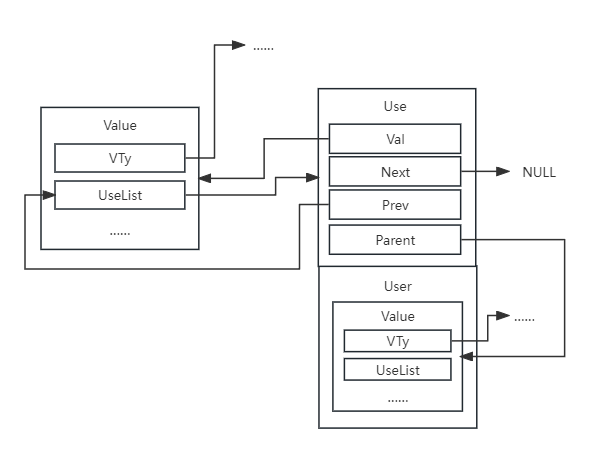
一个形如%1 = add i32 %2, %3这里这个Instruction就是User(Value的使用者),%2、%3就是被使用的Value,Use就是这个使用的行为,在数据结构中体现为两点(User和Value)之间的一条边
Value
Value类中有一个UseList成员
1 | |
指向第一个Use
Use
一个Value被使用的所有Use以链表的形式连在一起
1 | |
- Val:指向被使用的Value
- Next:指向下一个Use
- Prev:指向上一个Prev
- Parent:指向User
User
Use会放在User结构体前,如上图所示👆
Use结构体有两种放置方式
固定个数的Use,以数组的形式放在User前
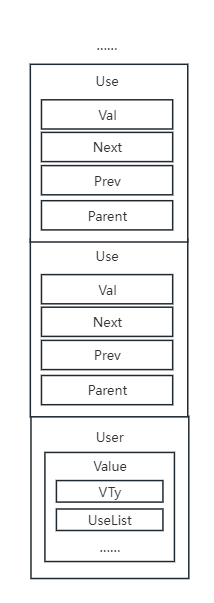
不定个数的Use,一个Use放在User前,这个Use的Prev指针指向Use数组
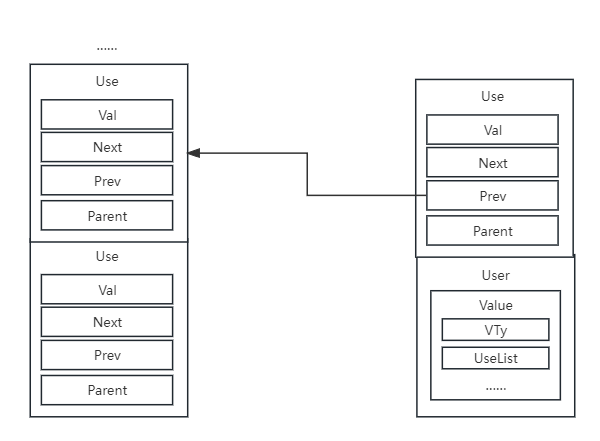
这点可以通过getOperandList函数看出来
1 | |
当HasHungOffUses为0时,Use的Prev指向前一个Use的Next,由于Prev是Use**类型所以其实还是指向自己(
GlobalVariable
储存全局变量相关信息
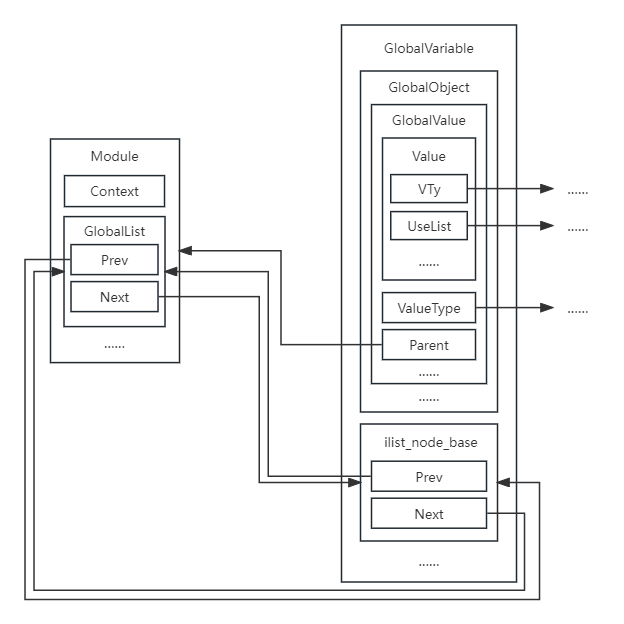
相关操作
创建一个GlobalVariable
1
2
3
4
5
6
7
8
9
10
11
12
13
14GlobalVariable(Type *Ty, bool isConstant, LinkageTypes Linkage,
Constant *Initializer = nullptr, const Twine &Name = "",
ThreadLocalMode = NotThreadLocal, unsigned AddressSpace = 0,
bool isExternallyInitialized = false);
GlobalVariable(Module &M, Type *Ty, bool isConstant, LinkageTypes Linkage,
Constant *Initializer, const Twine &Name = "",
GlobalVariable *InsertBefore = nullptr,
ThreadLocalMode = NotThreadLocal,
Optional<unsigned> AddressSpace = None,
bool isExternallyInitialized = false);
GlobalVariable(const GlobalVariable &) = delete;
GlobalVariable &operator=(const GlobalVariable &) = delete;判断是否能在运行时修改
1
bool isConstant() const
Function
主要成员有
- 一个Arguments指针,指向Argument数组
- 一个BasicBlock双链表
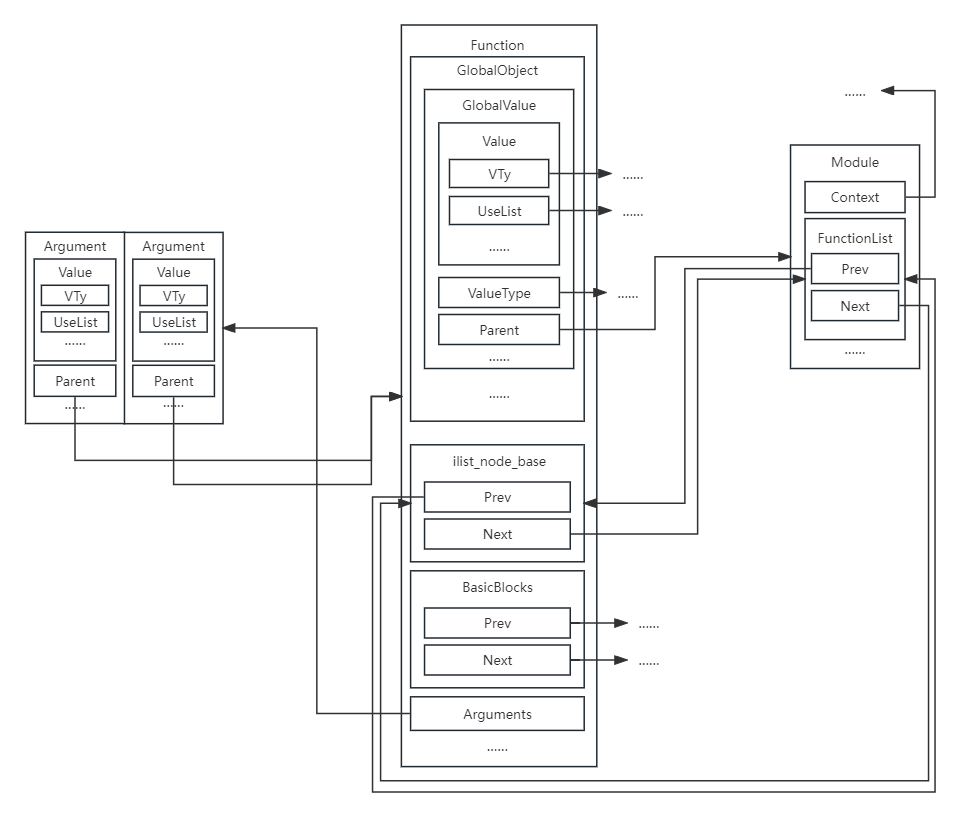
相关操作
迭代器,相关操作同Module
BasicBlock迭代器
1
2
3
4
5
6
7
8
9
10
11
12
13
14//===--------------------------------------------------------------------===//
// BasicBlock iterator forwarding functions
//
iterator begin() { return BasicBlocks.begin(); }
const_iterator begin() const { return BasicBlocks.begin(); }
iterator end () { return BasicBlocks.end(); }
const_iterator end () const { return BasicBlocks.end(); }
size_t size() const { return BasicBlocks.size(); }
bool empty() const { return BasicBlocks.empty(); }
const BasicBlock &front() const { return BasicBlocks.front(); }
BasicBlock &front() { return BasicBlocks.front(); }
const BasicBlock &back() const { return BasicBlocks.back(); }
BasicBlock &back() { return BasicBlocks.back(); }Argument迭代器
1
2
3
4
5
6
7
8
9
10
11
12
13
14
15
16
17
18
19
20
21
22
23
24
25
26
27
28
29
30arg_iterator arg_begin() {
CheckLazyArguments();
return Arguments;
}
const_arg_iterator arg_begin() const {
CheckLazyArguments();
return Arguments;
}
arg_iterator arg_end() {
CheckLazyArguments();
return Arguments + NumArgs;
}
const_arg_iterator arg_end() const {
CheckLazyArguments();
return Arguments + NumArgs;
}
Argument* getArg(unsigned i) const {
assert (i < NumArgs && "getArg() out of range!");
CheckLazyArguments();
return Arguments + i;
}
iterator_range<arg_iterator> args() {
return make_range(arg_begin(), arg_end());
}
iterator_range<const_arg_iterator> args() const {
return make_range(arg_begin(), arg_end());
}
创建一个Function
1
2
3
4
5
6
7
8
9
10
11
12
13
14static Function *Create(FunctionType *Ty, LinkageTypes Linkage,
const Twine &N, Module &M);
static Function *Create(FunctionType *Ty, LinkageTypes Linkage,
unsigned AddrSpace, const Twine &N = "",
Module *M = nullptr) {
return new Function(Ty, Linkage, AddrSpace, N, M);
}
static Function *Create(FunctionType *Ty, LinkageTypes Linkage,
const Twine &N = "", Module *M = nullptr) {
return new Function(Ty, Linkage, static_cast<unsigned>(-1), N, M);
}FunctionType的构造见上,getOrInsertFunction函数其实也是Create的封装
获取函数返回类型
1
Type *getReturnType() const { return getFunctionType()->getReturnType(); }FunctionType是Type的子类,ReturnType和ParamType都存在Type类型的ContainedTys成员里,这是一个Type数组
1
2
3
4class Type {
protected:
unsigned NumContainedTys = 0;
Type * const *ContainedTys = nullptr;可以从getXXXType函数中看出来
1
2
3
4
5
6
7
8
9// Function
Type *getReturnType() const { return getFunctionType()->getReturnType(); }
// FunctionType
FunctionType *getFunctionType() const {
return cast<FunctionType>(getValueType());
}
Type *getReturnType() const { return ContainedTys[0]; }
Type *getParamType(unsigned i) const { return ContainedTys[i+1]; }返回函数的入口BasicBlock
1
2const BasicBlock &getEntryBlock() const { return front(); }
BasicBlock &getEntryBlock() { return front(); }设置&获取调用规则
1
2
3
4
5
6
7
8
9CallingConv::ID getCallingConv() const {
return static_cast<CallingConv::ID>((getSubclassDataFromValue() >> 4) &
CallingConv::MaxID);
}
void setCallingConv(CallingConv::ID CC) {
auto ID = static_cast<unsigned>(CC);
assert(!(ID & ~CallingConv::MaxID) && "Unsupported calling convention");
setValueSubclassData((getSubclassDataFromValue() & 0xc00f) | (ID << 4));
}🌰,不设置好像也没啥问题(
1
2Function *foo;
foo->setCallingConv(CallingConv::C);
BasicBlock
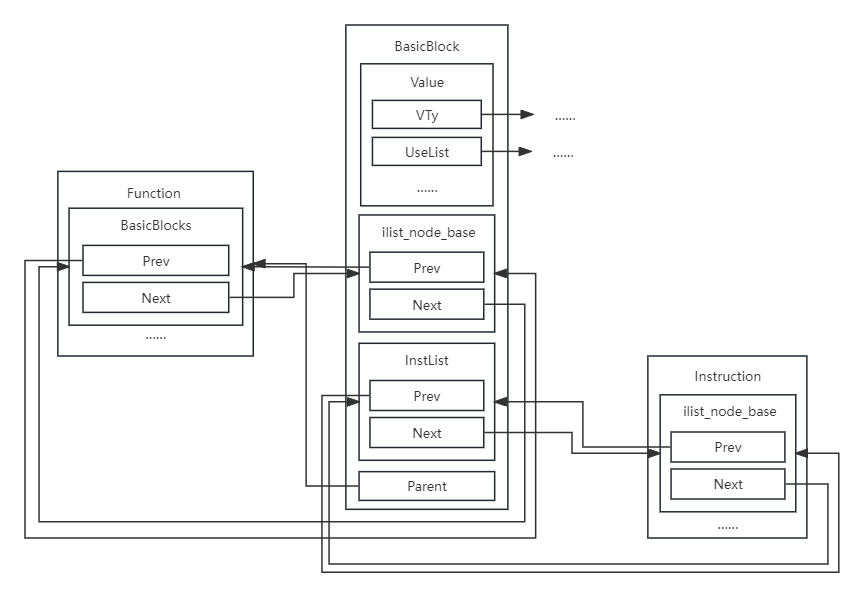
相关操作
创建一个BasicBlock
1
2
3
4
5static BasicBlock *Create(LLVMContext &Context, const Twine &Name = "",
Function *Parent = nullptr,
BasicBlock *InsertBefore = nullptr) {
return new BasicBlock(Context, Name, Parent, InsertBefore);
}当InsertBefore为NULL时默认插入Function末尾
1
2
3
4
5
6
7
8
9
10
11
12
13BasicBlock::BasicBlock(LLVMContext &C, const Twine &Name, Function *NewParent,
BasicBlock *InsertBefore)
: Value(Type::getLabelTy(C), Value::BasicBlockVal), Parent(nullptr) {
if (NewParent)
// Insert unlinked basic block into a function. Inserts an unlinked basic block into Parent. If InsertBefore is provided, inserts before that basic block, otherwise inserts at the end.
insertInto(NewParent, InsertBefore);
else
assert(!InsertBefore &&
"Cannot insert block before another block with no function!");
setName(Name);
}🌰
1
2Function *customFunc;
BasicBlock *entryBlock = BasicBlock::Create(context, "", customFunc, 0);Instruction迭代器
1
2
3
4
5
6
7
8
9
10
11
12
13
14
15
16
17
18
19//===--------------------------------------------------------------------===//
/// Instruction iterator methods
///
inline iterator begin() { return InstList.begin(); }
inline const_iterator begin() const { return InstList.begin(); }
inline iterator end () { return InstList.end(); }
inline const_iterator end () const { return InstList.end(); }
inline reverse_iterator rbegin() { return InstList.rbegin(); }
inline const_reverse_iterator rbegin() const { return InstList.rbegin(); }
inline reverse_iterator rend () { return InstList.rend(); }
inline const_reverse_iterator rend () const { return InstList.rend(); }
inline size_t size() const { return InstList.size(); }
inline bool empty() const { return InstList.empty(); }
inline const Instruction &front() const { return InstList.front(); }
inline Instruction &front() { return InstList.front(); }
inline const Instruction &back() const { return InstList.back(); }
inline Instruction &back() { return InstList.back(); }获取所属Function
1
2const Function *getParent() const { return Parent; }
Function *getParent() { return Parent; }
Instruction
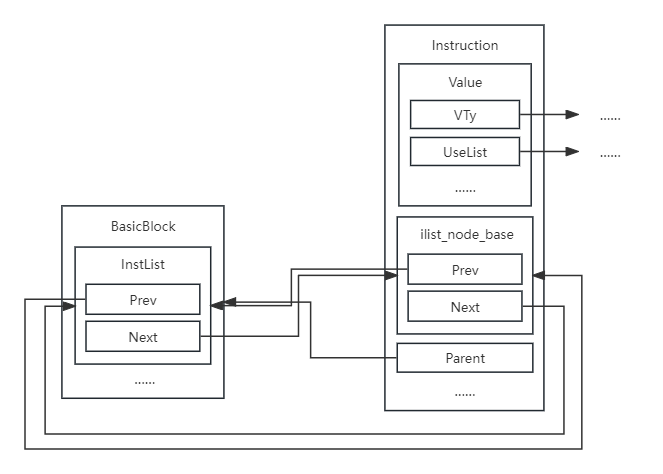
相关操作
获取父BasicBlock
1
2inline const BasicBlock *getParent() const { return Parent; }
inline BasicBlock *getParent() { return Parent; }获取指令操作码
1
unsigned getOpcode() const { return getValueID() - InstructionVal; }返回指令的另一个实例
1
Instruction *clone() const;但这个指令
- 没有名字
- 没有Parent
指令替换
1
2
3void ReplaceInstWithInst(BasicBlock::InstListType &BIL,
BasicBlock::iterator &BI, Instruction *I);
void ReplaceInstWithInst(Instruction *From, Instruction *To); // 不更新迭代器,会段错误🌰
1
2
3
4
5for (auto it = bas.begin(); it != bas.end(); it++){
……
ReplaceInstWithInst(old_ope->getParent()->getInstList(), it, myaddCall);
old_ope->replaceAllUsesWith(myaddCall);
}
不同Instruction的创建
只列出来了写作业的时候使用的
alloca
alloca命令是AllocaInst类型,继承关系是
1 | |
只比Instruction多了一个成员,表示储存数据的类型
1 | |
用new新建一个AllocaInst
1 | |
AddrSpace:可以通过Module获取
1
2Module *module;
module->getDataLayout().getAllocaAddrSpace()DataLayout就是
1
target datalayout = "e-m:e-p270:32:32-p271:32:32-p272:64:64-i64:64-f80:128-n8:16:32:64-S128"DataLayout有AllocaAddrSpace成员,getAllocaAddrSpace方法可以获取这个成员
1
2
3
4class DataLayout {
private:
unsigned AllocaAddrSpace;
unsigned getAllocaAddrSpace() const { return AllocaAddrSpace; }
Name:形如以下语句的返回值名称
1
%1 = alloca i32, align 4BasicBlock:所属基本块
InsertBefore:新建的Instruction会插在InsertBefore之前
ArraySize:数组大小,可以通过新建一个ConstantInt实现
1
static ConstantInt *get(LLVMContext &Context, const APInt &V);APInt可以通过new新建
1
2
3APInt(uint64_t *val, unsigned bits) : BitWidth(bits) {
U.pVal = val;
}🌰
1
Value* intValue = ConstantInt::get(context, APInt(32, 1));Align:可以通过Align创建
1
2
3
4
5
6explicit Align(uint64_t Value) {
assert(Value > 0 && "Value must not be 0");
assert(llvm::isPowerOf2_64(Value) && "Alignment is not a power of 2");
ShiftValue = Log2_64(Value);
assert(ShiftValue < 64 && "Broken invariant");
}🌰,Align也可以在创建AllocaInst之后设置
1
ptr3->setAlignment(Align(4));
🌰
1 | |
store
store命令是StoreInst类型
比Instruction多了一个SSID
1 | |
可以通过构造函数新建一个StoreInst
1 | |
- 将Val存入Ptr
- isVolatile表示是否优化
🌰
1 | |
load
load是LoadInst类型,也比Instruction多一个SSID
1 | |
构造函数
1 | |
🌰
1 | |
add
add的类型是BinaryOperator,没有自己的data域
1 | |
BinaryOps
1 | |
🌰
1 | |
icmp
icmp的类型是ICmpInst,没有自己的data域
1 | |
Predicate是比较的类型
1 | |
🌰
1 | |
需要常数可以创建ConstantInt
br
BranchInst,无data域
1 | |
🌰
1 | |
ret
ReturnInst,无data域
1 | |
🌰
1 | |
call
CallInst,CallBase有自己的data域
1 | |
好多重载(
1 | |
🌰
1 | |